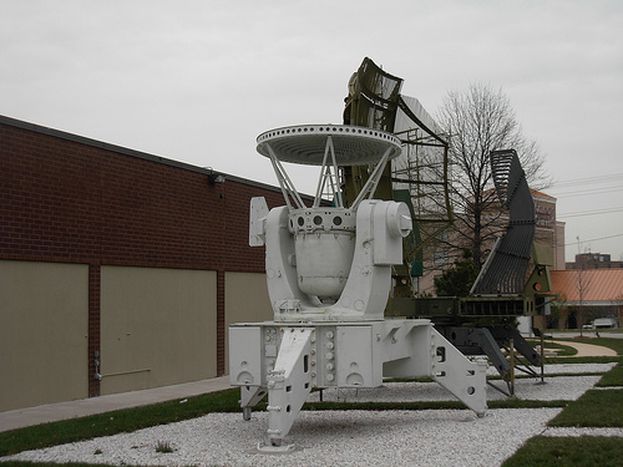
Radar station for US anti-missile defence on Czech soil?
Published on
Translation by:
Susannah Readett-BayleyBut it hadn’t banked on such a large opposition from two thirds of the population and such an angry reaction from its future neighbours. A return to the cold war?
‘I am against this radar station,’ explains Michal, a 21-year-old economics student. ‘I don’t want to see the Americans poking about in our country. We don’t want any non-Czech soldiers here; we’ve been through enough foreign occupation in the last century!’ His friends disagree. ‘The Americans have helped the Czech Republic a lot, we should repay them now,’ thinks Thomas, 22. Ondra, 21, also believes the US is a valuable partner for her country. ‘It is the only country that can guarantee that democracy is defended in the world. We don’t have much faith in Europe after the Munich treaty in 1938 when France and Great Britain abandoned us to Hitler!’ The three students are battling it out in a bar in Prague’s city centre. Surveys show that nearly two thirds of the Czech population are against the American radar base.
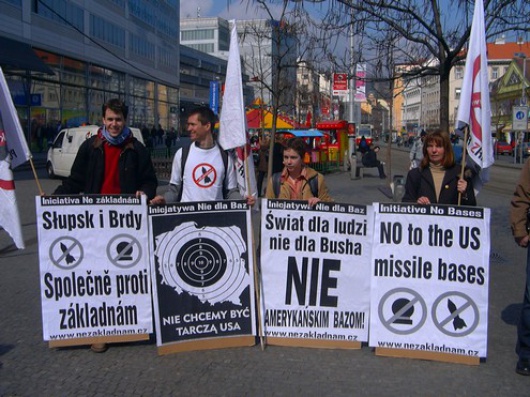 Protest against the base at the end of March 2008, Prague (Photo: ©Sandra Wickert)
Protest against the base at the end of March 2008, Prague (Photo: ©Sandra Wickert)
A strangely complex situation
The US want to complete their anti-missile circuit by installing the radar base in the Czech Republic and ten interceptor rockets in Poland, thereby protecting themselves from their enemies, primarily Iran. The Czech government are largely divided on the issue. The biggest party in the coalition, the right-wing civil democratic party (ODS) has given its support to the project which has however been rejected by the green party and raised serious doubts in the christian democratic party (KDU-CSL). On the left-wing opposition, the Czech socialist party (CSSD) and the communist party (KSCM) both strongly oppose the American initiative and are demanding a referendum on the question.
Between the two, Russia feels like an American spy target and feeling edgy, is re-launching test flights for its long distance bombers capable of transporting nuclear missiles and threatening to withdraw from the INF treaty on the elimination of ground launched and short range nuclear missiles signed by social democrat leader Mikhail Gorbachev and former US president Ronald Reagan in 1987. Not only that, but Europe watches on with little comment on the privileged relationship that is developing between these eastern countries and the USA – despite NATO being involved as the honey to help the medicine go down.
Tonda, 27, is a law student and the representative of the young branch of the centre left party, the CSSD. For him, there is no doubt. ‘We don't believe that this base will be used against Iran and Korea like our government have said. The only country to have high technology nuclear missiles is Russia, and the stakes are too high to call a referendum on it. These bases in Poland and the Czech Republic are going to increase tensions between Russia and the USA. We don’t want to find ourselves in the middle of another cold war!’
Confusion for Czech officials
Over at the ministry of defence, they are having a difficult time convincing 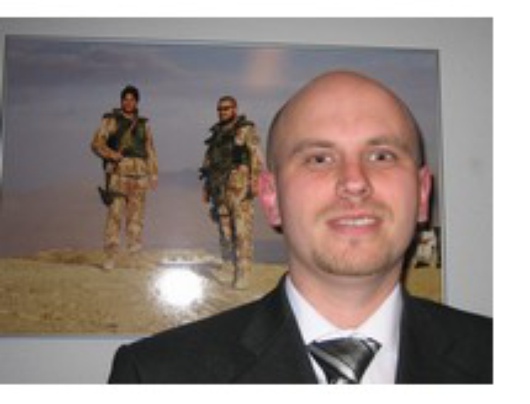 foreign journalists. Janem Pejskem, the head of the press department, insists that the two treaties negotiated with the Americans will go to parliament (one relates to the base itself and the second refers to American personnel on Czech territory). He recognises the question of jurisdiction raised by the presence of these 200 personnel. But what is the aim of this base? ‘To protect Europe against long-distance missiles’ – an answer overflowing with kindness but that doesn’t explain Europe’s non-existent role in the project. When pushed a little, he finally admits that in fact, few countries support it, even amongst the allies.
foreign journalists. Janem Pejskem, the head of the press department, insists that the two treaties negotiated with the Americans will go to parliament (one relates to the base itself and the second refers to American personnel on Czech territory). He recognises the question of jurisdiction raised by the presence of these 200 personnel. But what is the aim of this base? ‘To protect Europe against long-distance missiles’ – an answer overflowing with kindness but that doesn’t explain Europe’s non-existent role in the project. When pushed a little, he finally admits that in fact, few countries support it, even amongst the allies.
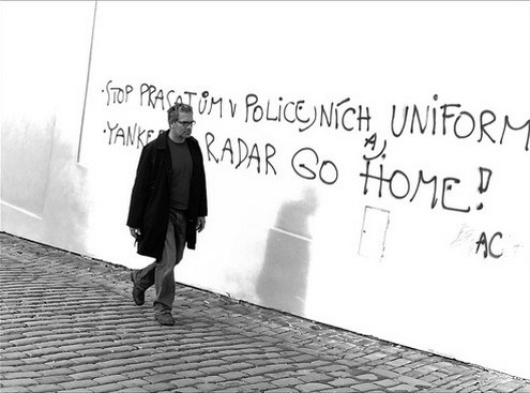 Graffiti tag: 'Yankees & Radar go home!' (Photo: ©Anton de Young/ Flickr)
Graffiti tag: 'Yankees & Radar go home!' (Photo: ©Anton de Young/ Flickr)
When it comes to Russia, the Czech Republic finds itself in blatant conflict. To reassure Putin, the US have suggested that Russian officers visit the base from time to time to check the radar is not pointed at them. This is totally unthinkable for the Czechs who after decades of Soviet occupation are not prepared to see a single Russian soldier on their territory. ‘It's a very difficult question,’ is the cold response from Janem Pejskem. Whatever happens, if the treaties are signed and voted in by parliament in 2009, building will begin in 2009 and be finished by 2011 or 2012.
The village that's determined to fight
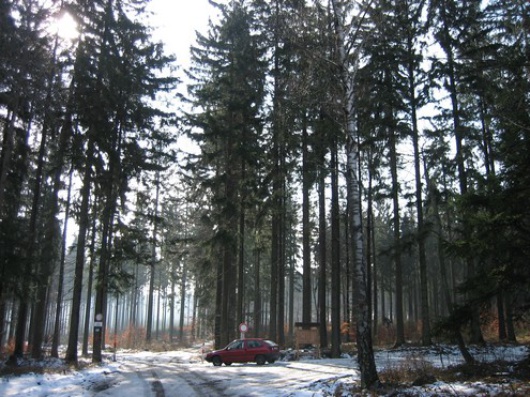 Enter the military base: this trees will have disappeared within three years (Photo: ©Agnès Baritou)
Enter the military base: this trees will have disappeared within three years (Photo: ©Agnès Baritou)
Towards Brdy, 90 km from Prague, grafitti saying USA terrorists scarwled on a wall suggests a different attitude. 400m from the forest that marks the start of the military base that will house the radar base, the little village of Trokavec is fighting this enormous machine which threatens to destroy its quiet life. Jan Neoral is a 66-year-old robust mayor who refuses to be walked over by the government. Their lies are uncovered here: for example, the area of the site has gone from 2 hectares to 400 – the previous night the figure from the ministry of defence was 200 hectares. It's the same story for how the radar works: the energy that will be emitted has officially increased from 170 kilowatts to 10 megawatts. The pulsations the radar gives off will reach 200 gigawatts according to the mayor who has a strong knowledge in radio equipment.
The effects? 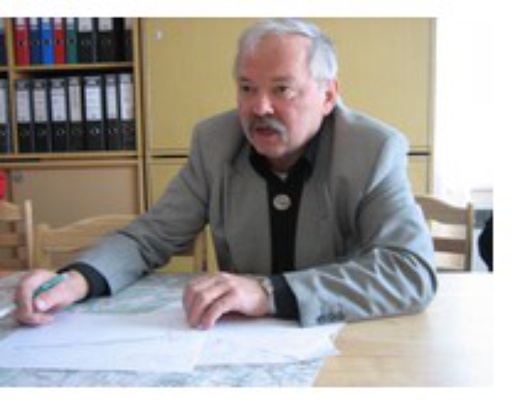 A net rise in cancer and leukaemia cases, a catastrophic impact on water, flora and fauna. But the mayor is also worried that the base will make their region a target. ‘In the case of a war, what will be the first thing to be destroyed? The radar base. A single nuclear weapon hitting the base would mean the end of the Czech Republic.’ Together with other local mayors, Jan Neoral is mounting an opposition to the project. He is in touch with American scientists, he has been to the European parliament, he is putting pressure on the Czech parliament to vote against the project. ‘General Obering, head of US missile defence agency defended the project to the European parliament by saying that it's better to destroy rockets in the stratosphere than in the city,’ he concludes. ‘He forgot to add that for him, the stratosphere is Europe, and the city is the USA.’
A net rise in cancer and leukaemia cases, a catastrophic impact on water, flora and fauna. But the mayor is also worried that the base will make their region a target. ‘In the case of a war, what will be the first thing to be destroyed? The radar base. A single nuclear weapon hitting the base would mean the end of the Czech Republic.’ Together with other local mayors, Jan Neoral is mounting an opposition to the project. He is in touch with American scientists, he has been to the European parliament, he is putting pressure on the Czech parliament to vote against the project. ‘General Obering, head of US missile defence agency defended the project to the European parliament by saying that it's better to destroy rockets in the stratosphere than in the city,’ he concludes. ‘He forgot to add that for him, the stratosphere is Europe, and the city is the USA.’
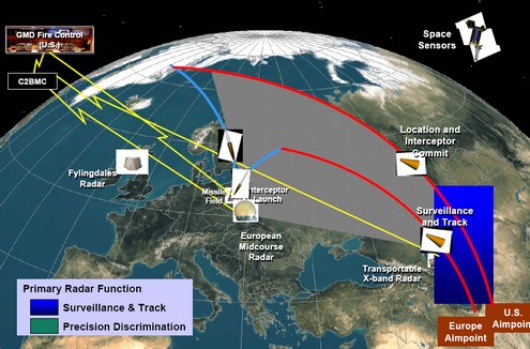 This official document by General Obering, head of the US missile defence agency, shows the case of a missile being fired from Iran and how it can be destroyed by the two radar bases in Czech Republic and Poland (Photo: ©US Missile Defense Agency)
This official document by General Obering, head of the US missile defence agency, shows the case of a missile being fired from Iran and how it can be destroyed by the two radar bases in Czech Republic and Poland (Photo: ©US Missile Defense Agency)
Thanks to Ondej Dank
Translated from Retour de la guerre froide sur le sol tchèque



